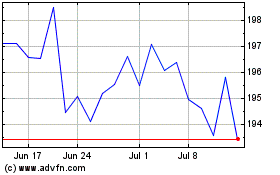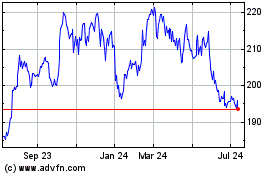CHICAGO (Dow Jones) -- The parent of the Chicago Mercantile
Exchange and Chicago Board of Trade put a price tag on continuing
to do business in its hometown: an extra $50 million a year
following a tax rise last January.
It's tougher to figure the cost of uprooting its electronic
trading systems, clearinghouse, management and staff -- plus the
knock-on effects for firms forced to reconfigure their business
with the world's biggest futures exchange operator.
CME Group Inc. (CME) has spent the last month jockeying with
lawmakers in Springfield, Ill. over a deal on taxes structured to
halve the company's bill to the state, home to its exchanges for
163 years, only to see the proposal flounder last week.
Illinois politicans will take another run at passing the package
next week, but CME still has rival suitors on the line. Last
Friday, Executive Chairman Terry Duffy took a meeting with
Indianapolis Mayor Gregory Ballard who pitched his state as a more
attractive home for CME.
Indiana, Florida and Texas all are pitching a more lightly taxed
home for CME, but traders and technologists are weighing the cost
of hooking up to a new and potentially far-flung exchange facility,
and the prospect of quieter bars in Chicago's financial
district.
"There are network effects in the trading community," said Jeff
Carter, a private investor and former CME board member based in
Chicago.
"A bunch of traders can go to Ceres and sit around and talk,
even the high-frequency guys," Carter said, referring to the noisy
bar that sits outside CME's Chicago trading floors. "Those are hard
things to quantify for CME," he said, adding that the company must
ultimately act in the best interest of its shareholders.
CME's Duffy has said that an out-of-state move would involve
shifting Globex, the company's electronic trading platform, as well
as the clearinghouse that handles trades and holds customer
collateral. The company's headquarters and related staff would also
move, as well as banking services.
A spokeswoman for CME declined further comment on any
relocation.
Beyond vacating corporate headquarters on Chicago's Wacker
Drive, CME confronts a trickier departure from its 428,000-square
foot data center in suburban Aurora, Ill. The facility houses not
only CME's exchange systems but those of the automated trading
firms and banks that rank as its heaviest-trading clientele.
Since the beginning of 2007 hundreds of millions of dollars have
been sunk into building the unit and its capacity for customer
systems, and replicating the data center in another state would
require CME to outfit a new structure and connect clients via new
electronic pathways before any trading could kick off under a
lower-tax regime.
Such an effort could take about a year, said Mark Casey,
president of network solutions company CFN Services.
"Those that have made infrastructure investments in the Aurora
site, particularly the fiber-based carriers, would not be excited
about a move, but most can handle it and with that they would
recognize the site would ultimately attract another data center
operator and therefore their investment would not be stranded,"
said Casey. CME could potentially recoup some of the cost by
selling the facility, he said.
The story could be different for high-frequency trading firms
that spent heavily to access a fiber corridor forged between New
York and Chicago by Spread Networks LLC, aimed at delivering market
information to computer-driven strategies as fast as possible. If
CME chose Florida or Texas, some of that investment could be
stranded and another race may begin to create a higher-speed
information pathway to its new home.
Observers have seen suitor states extending subsidies to defray
some of the technology relocation, as well as the expense of hiring
moving vans and logistics specialists to shift CME's staff, some
2,000 of which work in the Chicago area. United Van Lines LLC,
which handles corporate relocations, charges rates based on how
heavy goods are and how far they need to go, according to
spokeswoman Melissa Sullivan.
"Typically we see companies of this size plan a move six months
to a year in advance," she said.
CME's physical trading floors would continue to anchor Chicago's
financial district, and with 85% of CME's volumes now electronic,
few expect the city's cluster of proprietary trading firms and
commodity fund managers to immediately follow CME to another
state.
But eventually customers may seek to maintain the "face time"
they have had with CME staff and executives in Chicago, adding new
positions elsewhere or ultimately moving some their own operations,
said Anthony Dostellio, recruiting manager with executive search
firm Objective Paradigm.
"One of the reasons we're based in Chicago is because a lot of
our clients are, and our clients are here partly because CME is
here," he said. "Over time a lot of firms that are here and grow
and create jobs might find it easier to be close to where the hub
is located."
Matt Haraburda, president of Chicago-based XR Trading LLC, said
few industries are as anchored to a specific company -- and city --
as the U.S. futures market is to CME and Chicago.
"The CME leaving Illinois would certainly give less of a reason
for trading firms to exist here," he said.
-By Jacob Bunge, Dow Jones Newswires; 312 750 4117;
jacob.bunge@dowjones.com
CME (NASDAQ:CME)
Historical Stock Chart
From Jun 2024 to Jul 2024

CME (NASDAQ:CME)
Historical Stock Chart
From Jul 2023 to Jul 2024
